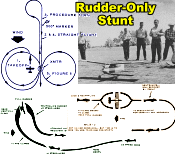 Not all that long ago, my interpretation
of radio-controlled (R/C)
rudder-only (RO) flying was that the airplane operated from a single channel
controlling the rudder. That is the way it began, I suppose, but as aerobatic
competition entered the picture, it expanded to include throttle control on the
engine. Some models, I believe might have also had elevators and/or aileron
control, but during competition flights, only the engine throttle and rudder
were allowed to be manipulated. I have flown many R/C airplanes with just two
channels - rudder and elevator - but never with rudder and engine throttle. In
fact, the only airplane I have ever flown with only rudder control is an
experimental rubber-powered job with an electromagnet coil and a permanent
magnet on the rudder. Many magazine articles...
Not all that long ago, my interpretation
of radio-controlled (R/C)
rudder-only (RO) flying was that the airplane operated from a single channel
controlling the rudder. That is the way it began, I suppose, but as aerobatic
competition entered the picture, it expanded to include throttle control on the
engine. Some models, I believe might have also had elevators and/or aileron
control, but during competition flights, only the engine throttle and rudder
were allowed to be manipulated. I have flown many R/C airplanes with just two
channels - rudder and elevator - but never with rudder and engine throttle. In
fact, the only airplane I have ever flown with only rudder control is an
experimental rubber-powered job with an electromagnet coil and a permanent
magnet on the rudder. Many magazine articles...
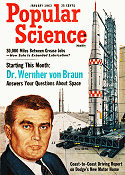 Former
Nazi Germany's famed rocket scientist
Dr. Wernher von Braun's 1963 Popular Science magazine column
answers questions submitted by reader representing the overwhelming public
interest in space science, which motivated his monthly contributions to share
complex topics accessibly. He explains that steering large rockets involves
deflecting exhaust thrust via swiveling nozzles or jet vanes, contrasting liquid
and solid propellant methods. Astronauts exit pressurized cabins using airlocks,
depressurizing the compartment before venturing into space. Liquid hydrogen's
efficiency as fuel stems from its high energy release and low molecular weight,
yielding superior exhaust velocity. Von Braun also touches on the moon's likely
sterility, solar flares' hazards to manned missions, and the sun’s volatile
activity, emphasizing space science’s interdisciplinary and dynamic nature. This
is the first of two articles submitted...
Former
Nazi Germany's famed rocket scientist
Dr. Wernher von Braun's 1963 Popular Science magazine column
answers questions submitted by reader representing the overwhelming public
interest in space science, which motivated his monthly contributions to share
complex topics accessibly. He explains that steering large rockets involves
deflecting exhaust thrust via swiveling nozzles or jet vanes, contrasting liquid
and solid propellant methods. Astronauts exit pressurized cabins using airlocks,
depressurizing the compartment before venturing into space. Liquid hydrogen's
efficiency as fuel stems from its high energy release and low molecular weight,
yielding superior exhaust velocity. Von Braun also touches on the moon's likely
sterility, solar flares' hazards to manned missions, and the sun’s volatile
activity, emphasizing space science’s interdisciplinary and dynamic nature. This
is the first of two articles submitted...
 Aircraft historians might find the information
from this 1942 edition of Flying Aces magazine useful. As has long been
the case on many Russian airplanes and helicopters, the basic outlines - and often
even the details - are recognizable from the original versions designed by the United
States, England, and Germany. The Russkies have been short on design and test capabilities
and long on materials, manpower, and espionage agents. It wouldn't be so bad if
the copying was not so obvious. Even their attempt at a space shuttle was a carbon
copy of ours. If not for their leaders' commitment to Communism and Socialism, Russia
could be...
Aircraft historians might find the information
from this 1942 edition of Flying Aces magazine useful. As has long been
the case on many Russian airplanes and helicopters, the basic outlines - and often
even the details - are recognizable from the original versions designed by the United
States, England, and Germany. The Russkies have been short on design and test capabilities
and long on materials, manpower, and espionage agents. It wouldn't be so bad if
the copying was not so obvious. Even their attempt at a space shuttle was a carbon
copy of ours. If not for their leaders' commitment to Communism and Socialism, Russia
could be...
 My daughter and her husband bought an 11-acre
chunk of a small, retired dairy farm in North Carolina a few years ago. Their property
included all of the original buildings, including the house, a large workshop, farm
equipment shed row, milking stalls, milk processing area, hay storage, a chicken
house, and a few other structures. Nearly everything is at least 50 years old -
and it shows. There are two
active wells on the property - one next to the house, and another in a field
next to a utility building. They are independent, but there is a pipe connecting
the two systems, with a valve in between to isolate them if necessary. The photo/drawing
to the right shows, schematically, what we believe, based on testing, to be the
water line layout. The valve was originally open, and then one day there was no
water service. With two pumps in parallel, if one pump fails the other will supply
sufficient water for all needs in what is now a domestic setting...
My daughter and her husband bought an 11-acre
chunk of a small, retired dairy farm in North Carolina a few years ago. Their property
included all of the original buildings, including the house, a large workshop, farm
equipment shed row, milking stalls, milk processing area, hay storage, a chicken
house, and a few other structures. Nearly everything is at least 50 years old -
and it shows. There are two
active wells on the property - one next to the house, and another in a field
next to a utility building. They are independent, but there is a pipe connecting
the two systems, with a valve in between to isolate them if necessary. The photo/drawing
to the right shows, schematically, what we believe, based on testing, to be the
water line layout. The valve was originally open, and then one day there was no
water service. With two pumps in parallel, if one pump fails the other will supply
sufficient water for all needs in what is now a domestic setting...
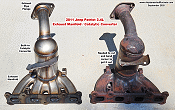 I have the great
misfortune of being a 2011 Jeep Patriot owner with the
welded
steel combination exhaust manifold and catalytic converter that forms heat stress
cracks, resulting in loud noise levels in the passenger cabin. Whilst out
driving one day recently, I noticed the sound level increased significantly, but
not at all speeds. After a lot of testing and researching on the Internet, I
concluded it had to be either a bad muffler, a loose baffle in the catalytic
converter, or a crack in the exhaust manifold. It sure sounded like it was
coming from the engine area, but I figured at 102,000 miles, it wouldn't hurt to
try replacing the muffler first. No such luck. I had a new muffler and the same
old noise. Upon removing the upper heat shield from the exhaust manifold, I
could immediately see two crack lines in the steel...
I have the great
misfortune of being a 2011 Jeep Patriot owner with the
welded
steel combination exhaust manifold and catalytic converter that forms heat stress
cracks, resulting in loud noise levels in the passenger cabin. Whilst out
driving one day recently, I noticed the sound level increased significantly, but
not at all speeds. After a lot of testing and researching on the Internet, I
concluded it had to be either a bad muffler, a loose baffle in the catalytic
converter, or a crack in the exhaust manifold. It sure sounded like it was
coming from the engine area, but I figured at 102,000 miles, it wouldn't hurt to
try replacing the muffler first. No such luck. I had a new muffler and the same
old noise. Upon removing the upper heat shield from the exhaust manifold, I
could immediately see two crack lines in the steel...
 A couple years ago I posted an article about
the Victor Stanzel ElectroMic "Copter" Tethered Helicopter that I had bought on
eBay. It was just like the one I had as a pre-teen in the 1960's. If memory serves
me correctly, I also had one of the ElectroMic Flash Tethered Airplanes as well.
Someday I'll probably buy one of those on eBay. The webpage hyperlinked above has
a video embedded that tells the story of the
Stanzel Brothers' Model Airplane Museum. You will be amazed at
all the types of models they produced - powered airplanes, gliders, helicopters,
flying saucers. They were a couple of the earliest pioneers in manufacturing ready...
A couple years ago I posted an article about
the Victor Stanzel ElectroMic "Copter" Tethered Helicopter that I had bought on
eBay. It was just like the one I had as a pre-teen in the 1960's. If memory serves
me correctly, I also had one of the ElectroMic Flash Tethered Airplanes as well.
Someday I'll probably buy one of those on eBay. The webpage hyperlinked above has
a video embedded that tells the story of the
Stanzel Brothers' Model Airplane Museum. You will be amazed at
all the types of models they produced - powered airplanes, gliders, helicopters,
flying saucers. They were a couple of the earliest pioneers in manufacturing ready...
 While perusing the local Goodwill store,
Melanie and I happened upon this old
gooseneck
lamp. Unlike most of the newer models found in places like Walmart, this one
is made of heavy stamped steel, and the gooseneck part is very sturdy with no plastic.
When you bend this lamp into position, it stays exactly where you put it without
reflexing back a little. It was just what Melanie needed for use on her sewing table,
so we bought it as a fixer-upper. As can be seen in the photos, the original condition
was useable, but not...
While perusing the local Goodwill store,
Melanie and I happened upon this old
gooseneck
lamp. Unlike most of the newer models found in places like Walmart, this one
is made of heavy stamped steel, and the gooseneck part is very sturdy with no plastic.
When you bend this lamp into position, it stays exactly where you put it without
reflexing back a little. It was just what Melanie needed for use on her sewing table,
so we bought it as a fixer-upper. As can be seen in the photos, the original condition
was useable, but not...
 Our one-car garage does not have a lot of
extra space in it, especially considering it also holds a riding lawn mower, a snow
blower, a backup power generator, and various and sundry yard and car tools. That
doesn't leave much room for the assortment of shoes and boots needed by Melanie
and me. We had been using a stack of cinder
blocks to stuff shoes in, but they looked rather crude and the holes were not
really big enough to allow the shoes to be fully enclosed. After completing building
a set of stairs into the basement, there were end pieces of the stair treads left
over that were just the right width to fit into the space where the cinder blocks
used to be stacked. 2x3 framing lumber...
Our one-car garage does not have a lot of
extra space in it, especially considering it also holds a riding lawn mower, a snow
blower, a backup power generator, and various and sundry yard and car tools. That
doesn't leave much room for the assortment of shoes and boots needed by Melanie
and me. We had been using a stack of cinder
blocks to stuff shoes in, but they looked rather crude and the holes were not
really big enough to allow the shoes to be fully enclosed. After completing building
a set of stairs into the basement, there were end pieces of the stair treads left
over that were just the right width to fit into the space where the cinder blocks
used to be stacked. 2x3 framing lumber...
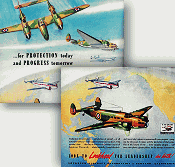 During World War II, many companies
who manufactured products for the military bought advertising space in popular household
magazines such as The Saturday Evening Post, Ladies' Home Journal,
Popular Mechanics, Better Homes & Gardens, Good Housekeeping,
and, as shown here Life. In this instance,
Lockheed Aircraft
Corporation (before merging with Martin Aircraft in 1995) ran a two-pager in
1942, near the beginning of official U.S. involvement following the Japanese bombing
of Pearl Harbor, featuring its line of both commercial and military aircraft. The
U.S. government commandeered many companies' manufacturing facilities to mandate
conversion to wartime products. It happened across a wide swath of industries including
aircraft, automotive...
During World War II, many companies
who manufactured products for the military bought advertising space in popular household
magazines such as The Saturday Evening Post, Ladies' Home Journal,
Popular Mechanics, Better Homes & Gardens, Good Housekeeping,
and, as shown here Life. In this instance,
Lockheed Aircraft
Corporation (before merging with Martin Aircraft in 1995) ran a two-pager in
1942, near the beginning of official U.S. involvement following the Japanese bombing
of Pearl Harbor, featuring its line of both commercial and military aircraft. The
U.S. government commandeered many companies' manufacturing facilities to mandate
conversion to wartime products. It happened across a wide swath of industries including
aircraft, automotive...
 Prior to the widespread use of mufflers
on radio controlled model aircraft engines,
exhaust dampers were installed that worked in unison with the
throttle. They were oblong or butterfly-shaped flat pieces of metal that pivoted
in the center and were connected via a short pushrod to the carburetor's throttle
arm. At full throttle, the damper was straight up and down to block the exhaust
port as little as possible. At idle, the damper usually totally blocked off the
exhaust port; of course some exhaust was still able to exit or the engine would
choke out and stop running. The first R/C engines I used in the 1970's came with
exhaust dampers...
Prior to the widespread use of mufflers
on radio controlled model aircraft engines,
exhaust dampers were installed that worked in unison with the
throttle. They were oblong or butterfly-shaped flat pieces of metal that pivoted
in the center and were connected via a short pushrod to the carburetor's throttle
arm. At full throttle, the damper was straight up and down to block the exhaust
port as little as possible. At idle, the damper usually totally blocked off the
exhaust port; of course some exhaust was still able to exit or the engine would
choke out and stop running. The first R/C engines I used in the 1970's came with
exhaust dampers...
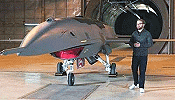 "Anduril Industries recently unveiled its
collaborative combat aircraft, or CCA, when CEO and co-founder Brian Schimpf took
a journalist into the hangar to show off the company's new
Fury, an unmanned autonomous CCA. It was the first time any media outlet was
permitted to view the aircraft up close. As a CCA, the Fury is designed to work
in coordination with manned aircraft. Anduril developed the Fury to sense and understand
everything that is happening in the airspace, and as it flies out ahead of a manned
aircraft, its job is to react to protect the pilot flying in trail. Schimpf said,
'The first thing you notice about this plane is that there's no cockpit. There is
no seat. There's no controls..."
"Anduril Industries recently unveiled its
collaborative combat aircraft, or CCA, when CEO and co-founder Brian Schimpf took
a journalist into the hangar to show off the company's new
Fury, an unmanned autonomous CCA. It was the first time any media outlet was
permitted to view the aircraft up close. As a CCA, the Fury is designed to work
in coordination with manned aircraft. Anduril developed the Fury to sense and understand
everything that is happening in the airspace, and as it flies out ahead of a manned
aircraft, its job is to react to protect the pilot flying in trail. Schimpf said,
'The first thing you notice about this plane is that there's no cockpit. There is
no seat. There's no controls..."
 After just 33 years, this crewel picture
that Melanie stitched is complete and has a
custom frame.
If memory serves correctly, we bought the crewel kit at a Ben Franklin store in
Severna Park, Maryland, in 1985 while living in Arnold, Maryland. She started it
shortly after getting it, and then it was put away until last year, 2017, when she
decided to complete the project. Most, if not all, of the needlework pictures Melanie
has done over the years have been placed in custom frames made by me. I've used
pine, oak, teak, hickory, mahogany, and now maple for this frame. The maple wood...
After just 33 years, this crewel picture
that Melanie stitched is complete and has a
custom frame.
If memory serves correctly, we bought the crewel kit at a Ben Franklin store in
Severna Park, Maryland, in 1985 while living in Arnold, Maryland. She started it
shortly after getting it, and then it was put away until last year, 2017, when she
decided to complete the project. Most, if not all, of the needlework pictures Melanie
has done over the years have been placed in custom frames made by me. I've used
pine, oak, teak, hickory, mahogany, and now maple for this frame. The maple wood...
 Per this 1962 Popular Science magazine
article, while awaiting Mariner 2's historic sweep past the cloud-shrouded planet
of Venus, experts of imagined Earth's nearest neighbor alternately as a lush prehistoric
swamp-world, a dust-choked desert, an endless steamy ocean, or a tar-lake Hades
reeking with oily smog. What they knew for sure: Venus, a near-twin to Earth in
size and gravity, shows only a bright, lemon-yellow veil when viewed through telescopes.
Spectrograms pushed earlier revealed thick carbon-dioxide and a wisp of water vapor,
but no firm answers about rotation speed or surface material. Then came shocking
new microwave temperature data -600 °F surface heat, day and night. It would be
1975 until the USSR's Venera 9 spacecraft landed on the surface and radioed
back the first images...
Per this 1962 Popular Science magazine
article, while awaiting Mariner 2's historic sweep past the cloud-shrouded planet
of Venus, experts of imagined Earth's nearest neighbor alternately as a lush prehistoric
swamp-world, a dust-choked desert, an endless steamy ocean, or a tar-lake Hades
reeking with oily smog. What they knew for sure: Venus, a near-twin to Earth in
size and gravity, shows only a bright, lemon-yellow veil when viewed through telescopes.
Spectrograms pushed earlier revealed thick carbon-dioxide and a wisp of water vapor,
but no firm answers about rotation speed or surface material. Then came shocking
new microwave temperature data -600 °F surface heat, day and night. It would be
1975 until the USSR's Venera 9 spacecraft landed on the surface and radioed
back the first images...

This particular
Hobby People advertisement is from page 53 of the March 1970 issue
of American Aircraft Modeler magazine. Hobby People was probably the first
company that I ever did mail order from to get airplane supplies. Hobby People is
no longer in operation. All copyrights (if any) are hereby acknowledged. Use the
U.S. Bureau of Labor Statistics' inflation calculator to see what items cost in
today's dollars. For instance, that $3.99 "Cox .049 Babe Bee" engine would be $26.16
in 2018 money. The "regular" price of $6.00 would be $39.34 in 2018. Cox International.
Use the U.S. Bureau of Labor Statistics' inflation calculator to see what items
cost in today's dollars. For instance, that $3.99 "Cox .049 Babe Bee" engine would
be $34.05 in 2025 money...
 One of the first woodworking projects I
remember doing after Melanie and I were married and in our own house was making
a paper towel
holder out of some scrap pieces of oak flooring. The wood was in the basement
of the house, probably from when it was originally installed sometime in the 1950s.
A few pieces were glued together along their tongue and groove edges, and then scraped
and sanded to a smooth, flat surface. The bottom curved relief shape was retained
for character. At some point during our many household moves, the paper towel holder
disappeared - we probably donated it as with...
One of the first woodworking projects I
remember doing after Melanie and I were married and in our own house was making
a paper towel
holder out of some scrap pieces of oak flooring. The wood was in the basement
of the house, probably from when it was originally installed sometime in the 1950s.
A few pieces were glued together along their tongue and groove edges, and then scraped
and sanded to a smooth, flat surface. The bottom curved relief shape was retained
for character. At some point during our many household moves, the paper towel holder
disappeared - we probably donated it as with...
 "From a [maple] seed-inspired design to a
26-minute flight time on a single rotor, a new
monocopter developed by SUTD researchers marks a 10-year journey towards redefining
how efficient small flying robots can be. When Singapore celebrated its 50th year
of independence in 2015, a team of student researchers led by Associate Professor
Foong Shaohui from Singapore University Technology and Design (SUTD) embarked on
an ambitious challenge: to design and build a drone capable of 50 minutes of sustained
flight. At the time, most hobbyist quadcopters could barely manage half of that.
The SG50 Multi-Rotor Drone..."
"From a [maple] seed-inspired design to a
26-minute flight time on a single rotor, a new
monocopter developed by SUTD researchers marks a 10-year journey towards redefining
how efficient small flying robots can be. When Singapore celebrated its 50th year
of independence in 2015, a team of student researchers led by Associate Professor
Foong Shaohui from Singapore University Technology and Design (SUTD) embarked on
an ambitious challenge: to design and build a drone capable of 50 minutes of sustained
flight. At the time, most hobbyist quadcopters could barely manage half of that.
The SG50 Multi-Rotor Drone..."
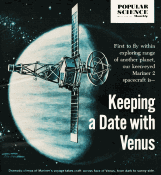 At launch in 1962 when this article appeared
in Popular Science magazine,
Mariner 2's planners imagined Venus cloaked by benign oceans or lush swamps
- temperatures perhaps only "hot-house Earth" elevated. Microwave echoes from Earth
hinted at a 600 °F surface, yet editors clung to hope that dense clouds concealed
cooler seas and maybe biology. Infrared spectra were interpreted as carbon-dioxide
greenhouse gases in a thin, relatively clear layer; the idea of surface pressures
a hundred times Earth, sulfuric-acid rain, and global 860 °F basalt plains
lay outside anyone's paradigm. A magnetosphere like Earth's was expected; Venus
instead proved geologically inert and wind-scoured, with sluggish super-rotation.
Fifty years later, radar from Magellan and Earth-borne interferometry have overwritten
1962 optimism with images of barren basalt plains and scorching CO₂ night.
At launch in 1962 when this article appeared
in Popular Science magazine,
Mariner 2's planners imagined Venus cloaked by benign oceans or lush swamps
- temperatures perhaps only "hot-house Earth" elevated. Microwave echoes from Earth
hinted at a 600 °F surface, yet editors clung to hope that dense clouds concealed
cooler seas and maybe biology. Infrared spectra were interpreted as carbon-dioxide
greenhouse gases in a thin, relatively clear layer; the idea of surface pressures
a hundred times Earth, sulfuric-acid rain, and global 860 °F basalt plains
lay outside anyone's paradigm. A magnetosphere like Earth's was expected; Venus
instead proved geologically inert and wind-scoured, with sluggish super-rotation.
Fifty years later, radar from Magellan and Earth-borne interferometry have overwritten
1962 optimism with images of barren basalt plains and scorching CO₂ night.
 The
1962 AMA Nationals competition was considered the first major
contest for scale radio controlled airplanes. To wit, this article from the 1963
Annual edition of American Modeler, says R/C scale "finally 'came of age.'"
Proportional radio sets were becoming common and the reliability of the airborne
electronics and batteries was going up while weight and size was coming down. Modelers
were much more willing to trust the radios to safely control models that often took
many hundreds of hours to build. Sharing frequencies at or near to the 27 MHz
band allocated by the FCC to R/C was still a huge risk, but the venues of major
contests provided protected areas that were far enough from most interference...
The
1962 AMA Nationals competition was considered the first major
contest for scale radio controlled airplanes. To wit, this article from the 1963
Annual edition of American Modeler, says R/C scale "finally 'came of age.'"
Proportional radio sets were becoming common and the reliability of the airborne
electronics and batteries was going up while weight and size was coming down. Modelers
were much more willing to trust the radios to safely control models that often took
many hundreds of hours to build. Sharing frequencies at or near to the 27 MHz
band allocated by the FCC to R/C was still a huge risk, but the venues of major
contests provided protected areas that were far enough from most interference...
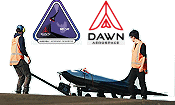 "A space domain awareness (SDA) payload
has flown on a sub-orbital spaceplane at supersonic speeds, an advance that could
provide an alternative to conventional satellite-based SDA. Scout Space's 'Morning
Sparrow' sensor suite flew aboard Dawn Aerospace's Aurora platform, an uncrewed
reusable rocket-powered high-altitude aircraft. The flight tested the integration
of Scout's 'Morning Sparrow' sensor suite aboard the Aurora platform, taking off
from Tāwhaki National Aerospace Centre in New Zealand. The flight also marks Scout
as the first commercial operator to fly on Dawn Aerospace's Aurora under a strategic
partnership in which Scout will develop a first-of-its-kind tactically responsive
Very Low Earth Orbit (VLEO)..."
"A space domain awareness (SDA) payload
has flown on a sub-orbital spaceplane at supersonic speeds, an advance that could
provide an alternative to conventional satellite-based SDA. Scout Space's 'Morning
Sparrow' sensor suite flew aboard Dawn Aerospace's Aurora platform, an uncrewed
reusable rocket-powered high-altitude aircraft. The flight tested the integration
of Scout's 'Morning Sparrow' sensor suite aboard the Aurora platform, taking off
from Tāwhaki National Aerospace Centre in New Zealand. The flight also marks Scout
as the first commercial operator to fly on Dawn Aerospace's Aurora under a strategic
partnership in which Scout will develop a first-of-its-kind tactically responsive
Very Low Earth Orbit (VLEO)..."
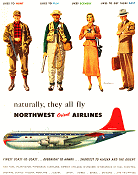 Northwest Orient Airlines, a prominent post-war
carrier, heavily promoted its transpacific and domestic routes in publications like
The Saturday Evening Post during the 1950s. Their advertisements, often
full-page and visually appealing, targeted a broad spectrum of potential travelers.
A common ad format featured a diverse group of Americans - hunters, fishermen, housewives,
and businessmen - representing the airline's wide appeal. This tableau of everyday
life was punctuated by a Northwest Orient Airlines aircraft, often a Boeing Stratocruiser
or Douglas DC-6, gracefully soaring across the page, connecting these disparate
figures and suggesting easy access to destinations both within the US and across
the Pacific. The ads emphasized comfort, speed, and the exotic allure of destinations
like Tokyo and Manila, solidifying Northwest Orient Airlines' image as a modern...
Northwest Orient Airlines, a prominent post-war
carrier, heavily promoted its transpacific and domestic routes in publications like
The Saturday Evening Post during the 1950s. Their advertisements, often
full-page and visually appealing, targeted a broad spectrum of potential travelers.
A common ad format featured a diverse group of Americans - hunters, fishermen, housewives,
and businessmen - representing the airline's wide appeal. This tableau of everyday
life was punctuated by a Northwest Orient Airlines aircraft, often a Boeing Stratocruiser
or Douglas DC-6, gracefully soaring across the page, connecting these disparate
figures and suggesting easy access to destinations both within the US and across
the Pacific. The ads emphasized comfort, speed, and the exotic allure of destinations
like Tokyo and Manila, solidifying Northwest Orient Airlines' image as a modern...
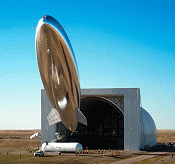 Japan's SoftBank is developing
airship-based
4G and 5G cell masts. "With more than 8,000 Starlink satellites in the sky today,
low Earth orbit may seem like the place to be to connect the next generation of
Internet and cellphone customers. However, some players are placing their bets slightly
closer to the ground. Starting next year, Tokyo's SoftBank Corp. will be beaming
a prototype 4G and 5G phone and broadband service from the stratosphere to Japanese
end users. Floating 20 kilometers above the Earth, the company's airship-based mast
will be using energy regeneration..."
Japan's SoftBank is developing
airship-based
4G and 5G cell masts. "With more than 8,000 Starlink satellites in the sky today,
low Earth orbit may seem like the place to be to connect the next generation of
Internet and cellphone customers. However, some players are placing their bets slightly
closer to the ground. Starting next year, Tokyo's SoftBank Corp. will be beaming
a prototype 4G and 5G phone and broadband service from the stratosphere to Japanese
end users. Floating 20 kilometers above the Earth, the company's airship-based mast
will be using energy regeneration..."
 Flying model helicopters of any sort were
fairly rare in 1952, when this edition of Air Trails magazine hit the news
stands. The sophisticated, miniaturized, smart stabilization systems of today's
models were not available at any price, and radio control was the realm of military
research vehicles. Methods for driving the rotors included glow and gas engines,
rubber bands, and even Jetex engines. Many free flight helicopters sported the
JETicopter's arrangement of a pair of engines at the end of a
moment arm which caused rotation. Cox .010 and .020 engines were a popular choice,
as were the Jetex engines. I always wondered what happened when...
Flying model helicopters of any sort were
fairly rare in 1952, when this edition of Air Trails magazine hit the news
stands. The sophisticated, miniaturized, smart stabilization systems of today's
models were not available at any price, and radio control was the realm of military
research vehicles. Methods for driving the rotors included glow and gas engines,
rubber bands, and even Jetex engines. Many free flight helicopters sported the
JETicopter's arrangement of a pair of engines at the end of a
moment arm which caused rotation. Cox .010 and .020 engines were a popular choice,
as were the Jetex engines. I always wondered what happened when...
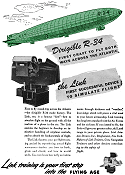 This 1946 Popular Science magazine
ad trumpets the Link trainer as the first ground device that "feels" like real flight.
Drawing parallel with the Atlantic-crossing dirigible R-34, it claims Link alone
lets novices master controls, banks, climbs, stalls, and instrument flying in darkness
or weather - before leaving the ground. Used by the Armed Forces and airlines, it
cuts training time and boosts safety, the ad says; if you want to own a private
plane, Link training is "your first step into the Flying Age." Engine instructor
Ed Link cobbled together the first "Pilot
Maker" in a Binghamton, New York, garage during 1929 and peddled it as a carnival
novelty until the Army Air Corps - embarrassed by a spate of fatal 1934 airmail
crashes...
This 1946 Popular Science magazine
ad trumpets the Link trainer as the first ground device that "feels" like real flight.
Drawing parallel with the Atlantic-crossing dirigible R-34, it claims Link alone
lets novices master controls, banks, climbs, stalls, and instrument flying in darkness
or weather - before leaving the ground. Used by the Armed Forces and airlines, it
cuts training time and boosts safety, the ad says; if you want to own a private
plane, Link training is "your first step into the Flying Age." Engine instructor
Ed Link cobbled together the first "Pilot
Maker" in a Binghamton, New York, garage during 1929 and peddled it as a carnival
novelty until the Army Air Corps - embarrassed by a spate of fatal 1934 airmail
crashes...
 Du-Bro was the first American company to
produce a radio control helicopter kit - the Whirlybird 505. That was sometime
around 1972 It was modeled after the way free flight helicopters were built an the
engine and propeller sitting on top of the main rotor, using a free-wheeling rotor
that turned in response to the counter torque of the engine. Fixed pitch rotor blades
were controlled via a flybar assembly as was the case prior to the advent of flybarless
rotor heads. Du-Bro's next helicopter was a much-improved and very popular Hughes 300,
using a driven rotor with the engine mounted in the fuselage. It also used a flybar
for rotor control. Building off that success, they next introduced this
TriStar R/C helicopter. It was smaller than the Hughes 300
and modeled after the RotorWay Scorpion homebuilt helicopter that was all the rage
in the 1970s and 80s ...
Du-Bro was the first American company to
produce a radio control helicopter kit - the Whirlybird 505. That was sometime
around 1972 It was modeled after the way free flight helicopters were built an the
engine and propeller sitting on top of the main rotor, using a free-wheeling rotor
that turned in response to the counter torque of the engine. Fixed pitch rotor blades
were controlled via a flybar assembly as was the case prior to the advent of flybarless
rotor heads. Du-Bro's next helicopter was a much-improved and very popular Hughes 300,
using a driven rotor with the engine mounted in the fuselage. It also used a flybar
for rotor control. Building off that success, they next introduced this
TriStar R/C helicopter. It was smaller than the Hughes 300
and modeled after the RotorWay Scorpion homebuilt helicopter that was all the rage
in the 1970s and 80s ...
 Way back in 1975, my friend, Jerry Flynn,
and I assisted Dick Weber in his successful flight on June 14, 1975, that set a
new FAI Closed Course Record of 225 miles in 5 hours and 38 minutes. We were both
flaggers to signal when the Tortoise has passed the distance markers. See the article
titled, "652 Miles Per Gallon," in the November 1975 issue of Model Aviation
magazine. We were not at all involved in all the painstaking effort that Dick had
put into preparing his model for the record flight. This account of
William Bertrand's trials and tribulations in finally setting
a new radio control world endurance record is valuable insight into what it can
take to achieve such a goal. test after test on engines, fuel, airframe, radio system,
fuel tanks ...
Way back in 1975, my friend, Jerry Flynn,
and I assisted Dick Weber in his successful flight on June 14, 1975, that set a
new FAI Closed Course Record of 225 miles in 5 hours and 38 minutes. We were both
flaggers to signal when the Tortoise has passed the distance markers. See the article
titled, "652 Miles Per Gallon," in the November 1975 issue of Model Aviation
magazine. We were not at all involved in all the painstaking effort that Dick had
put into preparing his model for the record flight. This account of
William Bertrand's trials and tribulations in finally setting
a new radio control world endurance record is valuable insight into what it can
take to achieve such a goal. test after test on engines, fuel, airframe, radio system,
fuel tanks ...
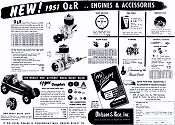 Ohlsson & Rice Inc., a powerhouse of
1950s American model-engineering, cast legendary glow-plug motors loved by car,
boat, and plane builders. Born in 1941 Los Angeles from ex-Utica Tool founders J.
Ohlsson and R. Rice, the firm cranked out rugged, light cast-aluminum blocks - mainstay
.23 to .49 cu in "O&R 60" and 1.3 hp sparkies - plus ready-to-pounce accessible
throttles, cowlings, wheels, balsa kits, and tools. Garish orange boxes and comics-style
decals made Christmas bright for boys fueling dreams on tether tracks or free-flight,
control line, and R/C. Military sales and glittering awards ensured post-war boom...
Ohlsson & Rice Inc., a powerhouse of
1950s American model-engineering, cast legendary glow-plug motors loved by car,
boat, and plane builders. Born in 1941 Los Angeles from ex-Utica Tool founders J.
Ohlsson and R. Rice, the firm cranked out rugged, light cast-aluminum blocks - mainstay
.23 to .49 cu in "O&R 60" and 1.3 hp sparkies - plus ready-to-pounce accessible
throttles, cowlings, wheels, balsa kits, and tools. Garish orange boxes and comics-style
decals made Christmas bright for boys fueling dreams on tether tracks or free-flight,
control line, and R/C. Military sales and glittering awards ensured post-war boom...
 The more things change, the more they stay
the same, as the saying goes. In 1942, when this featured appeared in Flying
Aces magazine, the participation of
women and girls in model aviation was very limited. Being that
it was more than 75 years ago, it might have been attributable to a lack of encouragement
or even outright discouragement by men and boys. However, here it is 75 years later
and the participation rate by women and girls is not that much greater. About the
only time you see them in photos in modeling magazines is when they are young girls
who are part of a schoolroom group activity conducted by an AMA member. the same
goes for model rockets. For that matter, the same goes for model cars, boats, and
helicopters. A lot of money and time...
The more things change, the more they stay
the same, as the saying goes. In 1942, when this featured appeared in Flying
Aces magazine, the participation of
women and girls in model aviation was very limited. Being that
it was more than 75 years ago, it might have been attributable to a lack of encouragement
or even outright discouragement by men and boys. However, here it is 75 years later
and the participation rate by women and girls is not that much greater. About the
only time you see them in photos in modeling magazines is when they are young girls
who are part of a schoolroom group activity conducted by an AMA member. the same
goes for model rockets. For that matter, the same goes for model cars, boats, and
helicopters. A lot of money and time...
 1968 was the beginning of the 3-man crew
Apollo era with the first manned space flight of the series, Apollo 7, launching
in October of that year. Model rocketry was all the rage. Per this article from
a 1968 issue of American Aircraft Modeler magazine, the average age of
an American model rocketeer was about 13.6 years. I was 10 years old at the time
and had by that time been building and flying model rockets for a year or two. Being
a fan of both airplanes and rockets - hence this website's name - I liked the
rocket boost gliders. The Estes Falcon, Nighthawk, and Space Plane
models were available at the time. The Falcon was the simplest with a pylon-mounted
engine that ejected with the ejection charge. The Nighthawk was more akin to the
Polish boost-Glider in this article, where the power pod separates from the airplane
and comes down via streamer while the airplane glides back to earth...
1968 was the beginning of the 3-man crew
Apollo era with the first manned space flight of the series, Apollo 7, launching
in October of that year. Model rocketry was all the rage. Per this article from
a 1968 issue of American Aircraft Modeler magazine, the average age of
an American model rocketeer was about 13.6 years. I was 10 years old at the time
and had by that time been building and flying model rockets for a year or two. Being
a fan of both airplanes and rockets - hence this website's name - I liked the
rocket boost gliders. The Estes Falcon, Nighthawk, and Space Plane
models were available at the time. The Falcon was the simplest with a pylon-mounted
engine that ejected with the ejection charge. The Nighthawk was more akin to the
Polish boost-Glider in this article, where the power pod separates from the airplane
and comes down via streamer while the airplane glides back to earth...
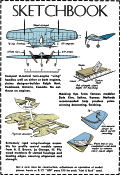 "Sketchbook" (aka
"Sketch Book") was a regular feature in American Modeler magazine. It consisted
of a handful of construction, operating adjustments, and finishing tips and suggestions
(aka "kinks") for model aircraft, rockets, cars, and boats, all submitted by readers.
A staff artist put those ideas to drawings. This October 1958 issue included a twin-engined
control line model that claimed to fly well even if one engine quit before the other
(which was almost always the case on fuel-powered models) - without an outboard
thrust offset - due to both engines being located as close as possible to the fuselage
centerline. Another tip suggested a method for marking and masking off complex,
curved areas for painting by cutting thin strips of Scotch Tape for the initial
outline. One reader showed how to significantly strengthen the wing-to-fuselage
joint...
"Sketchbook" (aka
"Sketch Book") was a regular feature in American Modeler magazine. It consisted
of a handful of construction, operating adjustments, and finishing tips and suggestions
(aka "kinks") for model aircraft, rockets, cars, and boats, all submitted by readers.
A staff artist put those ideas to drawings. This October 1958 issue included a twin-engined
control line model that claimed to fly well even if one engine quit before the other
(which was almost always the case on fuel-powered models) - without an outboard
thrust offset - due to both engines being located as close as possible to the fuselage
centerline. Another tip suggested a method for marking and masking off complex,
curved areas for painting by cutting thin strips of Scotch Tape for the initial
outline. One reader showed how to significantly strengthen the wing-to-fuselage
joint...

The Baltimore Sun newspaper, published not far from where I grew up near Annapolis,
Maryland, carried
Flyin' Jenny from the late 1930s until the strip ended in the
mid 1940s, so I saved a couple dozen from there. The first one I downloaded has
a publication date of December 7, 1941 - that date "which will live in infamy,"
per President Roosevelt. Many Americans were receiving word over the radio of the
Japanese attack on Pearl Harbor while reading this comic at the breakfast table.
This is the January 4, 1942, Flyin' Jenny comic strip. I expect that soon there
will be World War II themes...
 As reported in this 1950 issue of Air
Trails magazine, the
19th
annual National Championship Model Airplane Contest, held at Hensley Field Air
Station in Dallas, Texas, in 1950, unfolded against a backdrop of military readiness
as Marine and Navy air units prepared for the Korean War. Despite the gravity of
the situation, more than 500 ardent contestants from the United States, Canada,
and Mexico eagerly arrived at Hensley Field, ready to participate in the first-ever
National model meet in the Southwest. For many senior flyers, aged between 18 and
21, the competition held special significance, as they were either expecting draft
notices or had already decided to enlist...
As reported in this 1950 issue of Air
Trails magazine, the
19th
annual National Championship Model Airplane Contest, held at Hensley Field Air
Station in Dallas, Texas, in 1950, unfolded against a backdrop of military readiness
as Marine and Navy air units prepared for the Korean War. Despite the gravity of
the situation, more than 500 ardent contestants from the United States, Canada,
and Mexico eagerly arrived at Hensley Field, ready to participate in the first-ever
National model meet in the Southwest. For many senior flyers, aged between 18 and
21, the competition held special significance, as they were either expecting draft
notices or had already decided to enlist...
 The first thing I learned (or re-learned)
in reading this article is that in 1967, "Hertz" had only recently been assigned
as the official unit of frequency. According to Wikipedia, International Electrotechnical
Commission (IEC) adopted it in in 1930, but it wasn't until 1960 that it was adopted
by the General Conference on Weights and Measures (CGPM) (Conférence Générale des
Poids et Mesures). Hertz replace cycles per second (cps). The next thing that happened
was that I was reminded of how images such as the op-art tracing of
antenna oscillation that are routinely generated today by sophisticated
software, required huge amounts of setup time and trials to yield just a single
useful and meaningful image using actual hardware...
The first thing I learned (or re-learned)
in reading this article is that in 1967, "Hertz" had only recently been assigned
as the official unit of frequency. According to Wikipedia, International Electrotechnical
Commission (IEC) adopted it in in 1930, but it wasn't until 1960 that it was adopted
by the General Conference on Weights and Measures (CGPM) (Conférence Générale des
Poids et Mesures). Hertz replace cycles per second (cps). The next thing that happened
was that I was reminded of how images such as the op-art tracing of
antenna oscillation that are routinely generated today by sophisticated
software, required huge amounts of setup time and trials to yield just a single
useful and meaningful image using actual hardware...
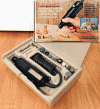 This
Dremel Model
381 Moto-Tool Kit is the next generation after my Dremel Model 371 Moto-Tool
kit that my Dremel Model 370 Moto-Tool was part of. Somewhere along the line I disposed
of the plastic box that held the Moto-Tool and accessories, so I looked on eBay
for a replacement. After many years of waiting, the closest I came was this Dremel
318 Moto-Tool Kit. It appears to be identical to the Model 371, only it came with
the Dremel Moto-Tool Model 380. The Model 380 has ball bearings whereas the Model
370 uses brass bushings. This Dremel Model 381 Moto-Tool Kit appears to be in like-new
condition and looks like it has never been used. Scans of all the manual pages are
posted below in case you have been looking for them.
This
Dremel Model
381 Moto-Tool Kit is the next generation after my Dremel Model 371 Moto-Tool
kit that my Dremel Model 370 Moto-Tool was part of. Somewhere along the line I disposed
of the plastic box that held the Moto-Tool and accessories, so I looked on eBay
for a replacement. After many years of waiting, the closest I came was this Dremel
318 Moto-Tool Kit. It appears to be identical to the Model 371, only it came with
the Dremel Moto-Tool Model 380. The Model 380 has ball bearings whereas the Model
370 uses brass bushings. This Dremel Model 381 Moto-Tool Kit appears to be in like-new
condition and looks like it has never been used. Scans of all the manual pages are
posted below in case you have been looking for them.
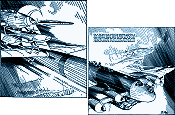 Arch Whitehouse's air adventure stories
with wily ballistics expert and ace pilot Kerry Keen (alter ego,
The Griffon) are one of my favorite reads in the vintage Flying Aces
magazines. While testing their amphibious Black Bullet over Long Island, aviator
Kerry Keen (the Griffon) and mechanic Barney O'Dare spot a stolen experimental aircraft
- a winged fortress capable of carrying tanks. When Barney vanishes mysteriously,
Keen discovers his partner has been entangled in a plot to steal "Avalin," a revolutionary
armor formula. The trail leads to kidnapped movie star Doreen Yardley, who unknowingly
received the formula- all while protecting Keen's masked identity...
Arch Whitehouse's air adventure stories
with wily ballistics expert and ace pilot Kerry Keen (alter ego,
The Griffon) are one of my favorite reads in the vintage Flying Aces
magazines. While testing their amphibious Black Bullet over Long Island, aviator
Kerry Keen (the Griffon) and mechanic Barney O'Dare spot a stolen experimental aircraft
- a winged fortress capable of carrying tanks. When Barney vanishes mysteriously,
Keen discovers his partner has been entangled in a plot to steal "Avalin," a revolutionary
armor formula. The trail leads to kidnapped movie star Doreen Yardley, who unknowingly
received the formula- all while protecting Keen's masked identity...
 This article entitled "The Boom
in R/C Boats" appeared in the June 1955 edition of Popular Electronics
magazine which, during the early years of its existence devoted quite a bit of print
space to radio control airplanes, boats and cars. As with all things electronics,
a huge surge in consumer interest was occurring with over-the-air communications.
Bill (William) Winter served as the editor of the Academy of Model Aeronautics'
(AMA's) American Modeler and American Aircraft Modeler magazines
from 1966 through 1974, but his efforts to promote all form of modeling - airplanes,
helicopters, cars, boats, trains, and rockets - covered many decades. His first
recorded article, "Building the Famous Udet Flamingo," (co-authored by Walter McBride),
was published in the March 1935 issue of Universal Model Airplane News
magazine...
This article entitled "The Boom
in R/C Boats" appeared in the June 1955 edition of Popular Electronics
magazine which, during the early years of its existence devoted quite a bit of print
space to radio control airplanes, boats and cars. As with all things electronics,
a huge surge in consumer interest was occurring with over-the-air communications.
Bill (William) Winter served as the editor of the Academy of Model Aeronautics'
(AMA's) American Modeler and American Aircraft Modeler magazines
from 1966 through 1974, but his efforts to promote all form of modeling - airplanes,
helicopters, cars, boats, trains, and rockets - covered many decades. His first
recorded article, "Building the Famous Udet Flamingo," (co-authored by Walter McBride),
was published in the March 1935 issue of Universal Model Airplane News
magazine...
 It would be interesting to do a side-by-side
comparison on what was considered engineered
control line stunt
model airplane design in 1957, when this article was written, to what is today considered
to be optimal design criteria. I am trying to get back into control line stunt flying
and have one model built currently, the Enterprise-E. It has been flown a few times
and is (was) extremely sensitive on the controls when set up per the plans. A little
bit of control handle movements resulted in a huge amount of both elevator and flap
deflection. Fortunately, access to the flap control horn is available through the
removable top fuselage hatch, so I was able to relocate the pushrod from the bellcrank
to the flap horn, and then from the flap horn...
It would be interesting to do a side-by-side
comparison on what was considered engineered
control line stunt
model airplane design in 1957, when this article was written, to what is today considered
to be optimal design criteria. I am trying to get back into control line stunt flying
and have one model built currently, the Enterprise-E. It has been flown a few times
and is (was) extremely sensitive on the controls when set up per the plans. A little
bit of control handle movements resulted in a huge amount of both elevator and flap
deflection. Fortunately, access to the flap control horn is available through the
removable top fuselage hatch, so I was able to relocate the pushrod from the bellcrank
to the flap horn, and then from the flap horn...
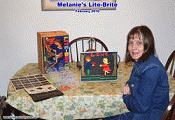 When Melanie and I got married in 1983,
part of her dowry included some of the toys she had as a little girl. A
Hasbro
Lite-Brite was one of them. Our kids played with it when they were young, but
somewhere along the line during our many household moves, it disappeared. We probably
donated it to the Salvation Army at some point - a lot of our stuff has ended up
there. About a month ago we started watching for a good one on eBay that didn't
cost too much. Finally, there was a 1967-vintage Lite-Brite in like-new condition
up for auction that we got for around $45. It has a nice box...
When Melanie and I got married in 1983,
part of her dowry included some of the toys she had as a little girl. A
Hasbro
Lite-Brite was one of them. Our kids played with it when they were young, but
somewhere along the line during our many household moves, it disappeared. We probably
donated it to the Salvation Army at some point - a lot of our stuff has ended up
there. About a month ago we started watching for a good one on eBay that didn't
cost too much. Finally, there was a 1967-vintage Lite-Brite in like-new condition
up for auction that we got for around $45. It has a nice box...
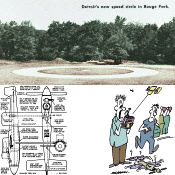 Per "Wild Bill" Netzenband's report in this
1961 issue of American Modeler magazine covered the Vancouver Bi-Liners,
MAC highlights, Alan Nichols' success in Thompson Trophy Racer events, encouraging
clubs to adopt the affordable, and slow-flying contests. He addresses backlogged
club crest submissions, noting the impracticality of featuring all due to volume.
Alan Nichols debunks the myth that models wear out quickly, citing his year-old
Nobler and a five-year-old Fierce Arrow with original engine. Memories resurface
of McDonnell Aircraft's picnic air shows, where Phil Hamm's reliable metal jet stood
out. Southern California's new Control-Line Association, led by John Gudvangan and
others, seeks enthusiasts. Detroit's Metropolitan Speed Association unveils an $8,000
Rouge Park speed circle, aiming for a competitive...
Per "Wild Bill" Netzenband's report in this
1961 issue of American Modeler magazine covered the Vancouver Bi-Liners,
MAC highlights, Alan Nichols' success in Thompson Trophy Racer events, encouraging
clubs to adopt the affordable, and slow-flying contests. He addresses backlogged
club crest submissions, noting the impracticality of featuring all due to volume.
Alan Nichols debunks the myth that models wear out quickly, citing his year-old
Nobler and a five-year-old Fierce Arrow with original engine. Memories resurface
of McDonnell Aircraft's picnic air shows, where Phil Hamm's reliable metal jet stood
out. Southern California's new Control-Line Association, led by John Gudvangan and
others, seeks enthusiasts. Detroit's Metropolitan Speed Association unveils an $8,000
Rouge Park speed circle, aiming for a competitive...
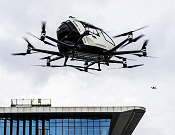 This article entitled "Why Pilots Will Matter
in the Age of
Autonomous Planes" appeared in the June 2025 issue of IEEE's Spectrum
magazine. "Long after planes start flying themselves, humans will still be in the
loop. In August 2001, an anonymous guest posted on the forum at Airliners.net, a
popular aviation website. 'How Long Will Pilots Be Needed?' they wondered, observing
that '20 years or so down the road' technology could be so advanced that planes
would fly themselves. 'So would it really be useful for a person to go to college
now and be an airline pilot if a few years down the road they will be phased out
by technology?' Twenty-four years later, the basic technology required to make aircraft
fly themselves exists, as evidenced by the fact that most commercial flights are
flown largely on autopilot..."
This article entitled "Why Pilots Will Matter
in the Age of
Autonomous Planes" appeared in the June 2025 issue of IEEE's Spectrum
magazine. "Long after planes start flying themselves, humans will still be in the
loop. In August 2001, an anonymous guest posted on the forum at Airliners.net, a
popular aviation website. 'How Long Will Pilots Be Needed?' they wondered, observing
that '20 years or so down the road' technology could be so advanced that planes
would fly themselves. 'So would it really be useful for a person to go to college
now and be an airline pilot if a few years down the road they will be phased out
by technology?' Twenty-four years later, the basic technology required to make aircraft
fly themselves exists, as evidenced by the fact that most commercial flights are
flown largely on autopilot..."
 This is the February 8, 1942, "Flyin' Jenny" comic strip. The Baltimore Sun newspaper, published
not far from where I grew up near Annapolis, Maryland, carried "Flyin' Jenny" from
the late 1930s until the strip ended in the mid 1940s, so I saved a couple dozen
from there. The first one I downloaded has a publication date of December 7, 1941
- that date "which will live in infamy," per President Roosevelt. Many Americans
were receiving word over the radio of the Japanese attack on Pearl Harbor while
reading this comic at the breakfast table. I expect that soon there will be World
War II themes. "Flyin' Jenny," whose real name was Virginia Dare (what's in
a name?), was a test pilot for Starcraft Aviation Factory who divided her time between
wringing out new airplane designs and chasing bad guys. She was the creation of
artist and storyteller Russell Keaton...
This is the February 8, 1942, "Flyin' Jenny" comic strip. The Baltimore Sun newspaper, published
not far from where I grew up near Annapolis, Maryland, carried "Flyin' Jenny" from
the late 1930s until the strip ended in the mid 1940s, so I saved a couple dozen
from there. The first one I downloaded has a publication date of December 7, 1941
- that date "which will live in infamy," per President Roosevelt. Many Americans
were receiving word over the radio of the Japanese attack on Pearl Harbor while
reading this comic at the breakfast table. I expect that soon there will be World
War II themes. "Flyin' Jenny," whose real name was Virginia Dare (what's in
a name?), was a test pilot for Starcraft Aviation Factory who divided her time between
wringing out new airplane designs and chasing bad guys. She was the creation of
artist and storyteller Russell Keaton...


